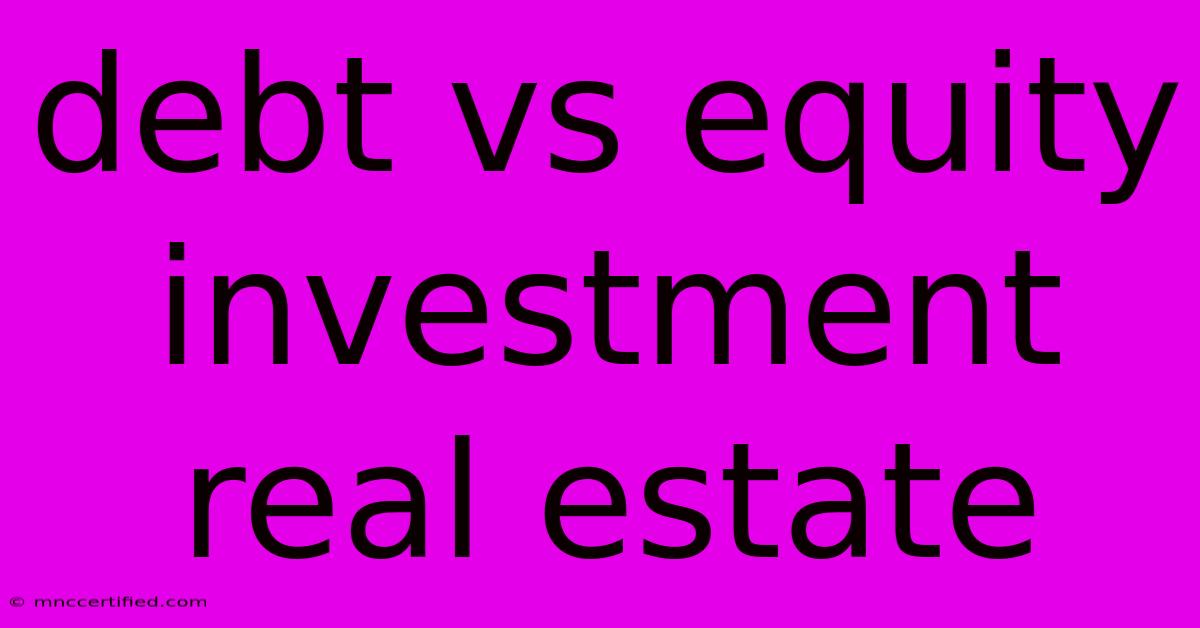Debt Vs Equity Investment Real Estate

Table of Contents
Debt vs Equity: Choosing the Right Real Estate Investment Strategy
Investing in real estate can be a lucrative endeavor, but choosing the right financing method is crucial for success. Two popular options are debt financing and equity financing, each offering unique advantages and drawbacks. Understanding the nuances of each strategy can help you make an informed decision that aligns with your financial goals and risk tolerance.
Debt Financing: Leveraging Loan Power
Debt financing involves borrowing money from lenders, such as banks or private investors, to purchase real estate. This allows you to acquire properties you might not be able to afford outright, leveraging your borrowed funds to generate returns. Here's a breakdown of debt financing:
Pros:
- Amplified Returns: Borrowed capital allows you to invest in larger, potentially more profitable, properties.
- Tax Deductions: Interest payments on debt financing are often tax-deductible, reducing your overall tax burden.
- Flexibility: You can choose from various loan types, including conventional mortgages, hard money loans, and private lending, depending on your specific needs.
Cons:
- Interest Payments: Regular interest payments increase your overall cost of investment and can eat into your profits.
- Risk of Default: If you fail to make your loan payments, you could lose your property through foreclosure.
- Loan Requirements: Lenders often have strict requirements for income, credit score, and down payment, which may limit your options.
Equity Financing: Investing Your Own Capital
Equity financing involves using your own funds or attracting investors to contribute capital in exchange for a share of ownership in the property. This approach allows you to retain complete control over your investment, but it comes with a higher upfront cost.
Pros:
- No Interest Payments: You avoid the burden of interest payments, allowing for greater potential profit.
- Full Control: You retain full control over the property and its management.
- Lower Risk of Default: Since you're using your own funds, you're less likely to face default and foreclosure.
Cons:
- Limited Investment Potential: Your investment potential is limited by the amount of capital you have available.
- Higher Initial Cost: Equity financing requires a significant upfront investment, potentially limiting your ability to invest in multiple properties.
- Sharing Profits: If you involve investors, you'll need to share profits according to your agreed-upon ownership structure.
Choosing the Right Path: A Practical Approach
The best financing method depends on your individual circumstances and investment goals. Here's a guide to help you choose:
Debt Financing:
- Suitable for:
- Individuals with good credit and income: Meeting lender requirements is crucial.
- Investors seeking to leverage their capital: Maximize potential returns through borrowed funds.
- Short-term investments: Faster return potential due to tax deductions.
Equity Financing:
- Suitable for:
- Individuals with significant capital: Higher upfront cost is necessary.
- Investors prioritizing control: Retain full ownership and management of the property.
- Long-term investments: No interest payments allow for greater profit accumulation over time.
Blending Both:
- Hybrid Approach: Combining debt and equity financing can provide a balanced strategy, allowing you to leverage borrowed funds while maintaining a portion of ownership.
- Joint Ventures: Partnering with investors who can provide equity can supplement your own capital, offering access to larger investment opportunities.
Final Thoughts
Choosing the right financing method for your real estate investments is a crucial decision. Thoroughly analyze your financial situation, risk tolerance, and investment goals to determine the best path forward. Consulting with a financial advisor can provide valuable insights and guidance to ensure you make the most informed decision for your unique circumstances.

Thank you for visiting our website wich cover about Debt Vs Equity Investment Real Estate. We hope the information provided has been useful to you. Feel free to contact us if you have any questions or need further assistance. See you next time and dont miss to bookmark.
Featured Posts
-
Everlake Life Insurance Company Login
Nov 10, 2024
-
Duel Masters Trading Card Game Online
Nov 10, 2024
-
Internet Liability Insurance Coverage
Nov 10, 2024
-
2024 Alabama Vs Lsu Spread And Odds
Nov 10, 2024
-
Andover Road Closures For Remembrance Events
Nov 10, 2024